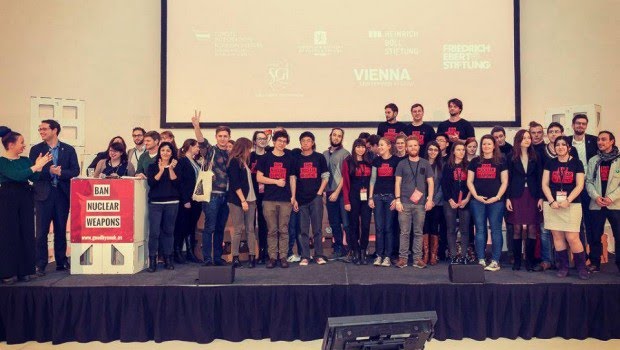This weekend, more than 600 campaigners gathered in Vienna in the largest ever civil society meeting on the abolition of nuclear weapons. The campaigners came from over 70 countries, representing more than 100 different organisations. The Civil Society Forum took place directly before the third international Conference on the Humanitarian Impact of Nuclear Weapons on 8-9 December.
The programme spanned all aspects of the nuclear weapons debate, from the perceived utility of nuclear weapons, to the international legal framework. The first day of the forum introduced participants to the key facts about nuclear weapons, including their catastrophic consequences for human health, the economy, and the environment.
In the panel on moral and ethical perspectives, representatives from various religious and theological backgrounds determined that the ownership and use of nuclear weapons is completely and unequivocally unacceptable. This panel included Judge Christopher Weeramantry, a former judge of the International Court of Justice, and Ela Gandhi, granddaughter of Mahatma Gandhi and lifelong peace activist. In the words of panelist Mustafa Cerić, “this discussion about nuclear weapons is not about what we believe, but about whether we are willing to wait to witness the destruction of our own planet.”
Participants also had the opportunity to witness the living legacy of nuclear weapons through discussions with survivors. Hiroshima survivor, Setsuko Thurlow, delivered an emotional and moving testimony about her experiences in the wake of the detonation in 1945. Karipbek Kuyukov, a survivor of the Semipalatinsk nuclear tests also spoke, declaring that every individual has an obligation to contribute to the elimination of nuclear weapons.
Eric Schlosser, author of Command and Control, highlighted that as long as nuclear weapons exist, there can be no real security. Schlosser spoke about numerous near-accidents throughout the history of nuclear weapons, and asserted that there is no definitive way to ensure nuclear weapons are completely safe and secure. The only way to eliminate the risk of nuclear catastrophe is to eliminate nuclear weapons altogether.
Participants also heard from politicians and representatives on the front lines of political action. Panels included Gry Larsen, former State Secretary of Norway, Bill Kidd of the Scottish National Party, and Dame Joan Ruddock of the United Kingdom, among others. Panelists noted that despite the challenges of political processes, progress is being made and there are enormous opportunities to make a ban treaty a reality. Paul Dewar, Canadian MP spoke directly to campaigners and urged them to challenge their own governments. Dewar noted that it is up to civil society to confront their representatives and force them to address nuclear weapons.
In addition to the numerous panels, the Civil Society Forum hosted a number of smaller sessions and discussions on strategic campaigning and the way forward. Campaigners learned about media interaction, campaigning success stories, and current initatives including the Don’t Bank on the Bomb divestment campaign. A number of partner organisations also hosted interactive stalls in the marketplace, including an ethics roadmap and a “weasel challenge.”
The forum concluded with a powerful discussion on the implications of a ban treaty and the way forward. Panelists Ray Acheson of Reaching Critical Will, Richard Lennane of Wildfire, and Gaukhar Mukhatyhanova of the James Martin Center for Nonproliferation Studies agreed that a binding treaty is an essential first step in ensuring a nuclear-free world. The third conference on the Humanitarian Impact of Nuclear Weapons must contribute to this process, and civil society is a decisive player in ensuring this progress continues. Richard Lennane declared that we must stop looking to nuclear weapon states to make the first move. The courage to initiate a ban must come from non-nuclear weapon states who stand up for what is right.
The Civil Society Forum was an inspiring and vivid reminder of the dynamism of civil society and the broad support for a nuclear weapons ban. Hundreds of civil society campaigners will continue their work at the Conference on the Humanitarian Impact of Nuclear Weapons, engaging with governments to initiative a ban treaty process. With over 150 governments registered to attend, it is clear the momentum for a ban is growing, and the time to act is now.

